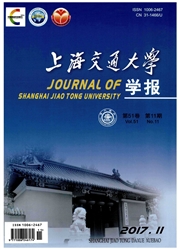

 中文摘要:
中文摘要:
基于运输合作博弈模型,探讨了Shapley值和公平分配解(PES)的成本分摊方式,分析了两者性质及其对运输联盟动态稳定性的影响.研究结果表明:承运人的Shapley值与自己的需求量正相关,与自己的产量负相关;承运人的PES与自己的需求量正相关,却与其他承运人的产量负相关;当承运人的产量和需求量同时增加,且增加幅度相等时,整个联盟运输成本的增加几乎都由该承运人独自承担;以Shapley值为分配规则时,“差异化联合”的联盟结构更稳定;以PES为分配规则时,“强强联合”的联盟结构更稳定.
 英文摘要:
英文摘要:
Based on the transportation cooperative game model, this paper discussed the cost allocation schemes under Shapley value and PES. The properties of these two cost allocation schemes and their affections to the farsighted stability of transportation alliance were analyzed. The studies indicate that carrier's Shapley value is positively correlated with his demand, and negatively correlated with his production volume; carrier's PES is positively correlated with his demand, while negatively correlated with other carriers' production volumes; the increasing cost of the whole transportation alliance is almost sustained by the carrier himself when his demand and production volume are increased in the same scale simultaneously; "differential alliance" is more stable with Shapley value being cost allocation scheme, while "alliance be tween giants" is more stable with PES being cost allocation scheme.
 同期刊论文项目
同期刊论文项目
 同项目期刊论文
同项目期刊论文
 期刊信息
期刊信息
